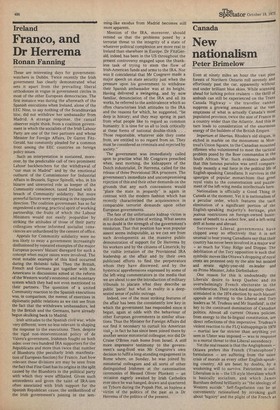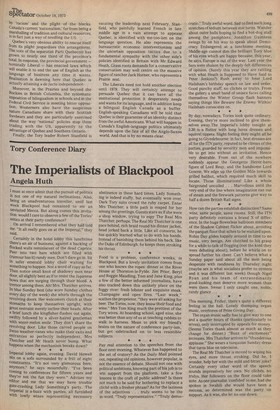Canada
New nationalism
Peter Brimelow
Even at ninety miles an hour the vast nine forests of Northern Ontario roll serenely and effortlessly past the car, apparently without end under brilliant blue skies. While scanning ahead for lurking police cruisers — the thrill of ambush can still be experienced on the Trans Canada Highway — the traveller cannot suppress a growing amazement at the vast emptiness of what is actually Canada's most populated province, twice the size of France in a country wider than the Atlantic. And this in turn leads to consideration of the enormous energy of the builders of the British Empire.
Imperium et libertas, Rhodes's old slogan, is etched in marble on the monument in Montreal's Union Square, to the Canadian mounted riflemen who volunteered to meet the tactical problem posed by the Boer commandos in the South African War. Such evidence abounds that this famous paradox was until comparatively recently a real force in the political life of English-speaking Canadians. It survives in the upsurges of popular monarchism that greet royal visits to the consternation and puzzlement of the left-wing media intellectuals here.
Nationalism is officially a Good Thing in Canada at the moment. Yet it is nationalism of a peculiar order, which features the tacit elimination of a significant portion of the English-speaking majority's heritage, plus jealous restrictions on foreign-owned businesses of benefit to a select few, and a left-wing drift at home and abroad.
Successive Liberal governments have chipped away so effectively that it is not unusual to hear young Canadians say that their country has never been involved in a major war — so much for Vimy Ridge and Dieppe. The debilitation of the Tory opposition is such that symbolic moves like Ottawa's dropping of royal crests are protested only by the able but isolated and erratic eighty-year-old ex-leader and ex-Prime Minister, John Diefenbaker.
One reason for this is undoubtedly the Liberals' desire to keep Quebec and its overwhelmingly French electorate in the confederation. Their rock-hard majority there, stimulated in the 1974 election by such blatant appeals as referring to the Liberal and Tory leaders as M. Trudeau and Mr Stanfield', is the key to the continued domination of Canadian politics. Almost all current Ottawa policies, from energy to the bi-lingual constitution, are direct reflections of this imperative. Trudeau's violent reaction to the FLQ kidnappings in 1970 — martial law far stricter than anything yet seen in Ulster was imposed — was in response to a mortal threat to this Liberal ascendency.
Yet the real reason is that the Anglophones — Ottawa prefers this French ('Francophone') formulation — are suffering from the same crisis of morale as every other English-speak ing country. All are beset by doubts, by a weakening will to survive. Patriotism is out. Liberalism is in — the US style liberalism which is basically socialism, and which James Burnham defined brilliantly as "the ideology of Western suicide." Self-flagellation can be as conveniently rationalised by invoking guilt about 'bigotry' and the plight of the French as by 'racism' and the plight of the blacks. Canada's current 'nationalism,' far from being a marshalling of tradition and cultural resources, IS in fact just a way of needling the US.
Quebec's very obvious ability to rescue itself from its plight jeopardises this arrangement. The vote of the separatist Parti Quebecois has grown to nearly one third of the province's total. In response, the provincial government — nominally Liberal has enacted laws which Will enable it to end the use of English as the language of business any time it wants. Realisation is dawning here that Quebec is actually attaining a de facto independence.
Moreover, in the Prairies and beyond the Rockies in British Columbia, the systematic Imposition of bilingualism in schools and in the Federal Civil Service is meeting bitter opposition. Westerners also have the suspicious nature Canadians share with their Scottish forebears and they are particularly exercised about the way • 'national' policies stop them trading with the US, apparently to the advantage of Quebec and Southern Ontario.
Finally, the Tory leader Robert Stanfield is vacating the leadership next February, Stanfield, who painfully learned French in late middle age in a vain attempt to appease Quebec, is identified with me-too-ism on the language question. He also represents the bureaucratic economic interventionism and the uncertain opposition tactics due to a fundamental sympathy with the other side's policies identified in Britain with Mr Edward Heath. Grass roots demands for a conservative conservatism may well centre on the massive figure of rancher Jack Homer, who represents a Prairie seat.
The Liberals need not hold another election until 1979. They will certainly attempt to persuade Quebec that it can have all the institutional protection it desperately nee§ls and wants for its language, and in addition keep a bilingual English Canada as a buffer. English-speaking Canadians will be told that Quebec is their guarantee of an identity distinct from the awful Americans. What will happen in Canada's English-language politics ultimately depends upon the fate of all the Anglo-Saxon world. And that is by no means clear.



































 Previous page
Previous page